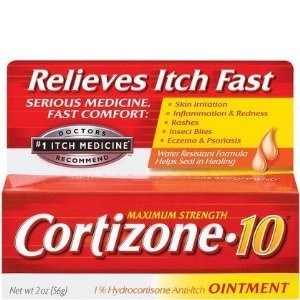Cortisone, a well known corticosteroid, is a treatment option for a wide range of ailments.
Are you wondering if your dog can benefit from taking this synthetic steroid?
 As a matter of fact, veterinarians prescribe it for allergies, joint pain (including arthritis and osteoarthritis) and other types of inflammatory-related pain.
As a matter of fact, veterinarians prescribe it for allergies, joint pain (including arthritis and osteoarthritis) and other types of inflammatory-related pain.
Cortisone is effective for dogs. However, side effects are a significant concern.
Involve your vet no matter how you envision this steroid should be used on your pet — either orally, as a topical cream or via injection.
Dogs Can Take Cortisone (vet prescription required)
Improper use must be avoided.
Do not go it alone; this is true even for over-the-counter products such as the one pictured above.
Whether it’s for alleviating stubborn itchiness or severe chronic pain, cortisone will have an effect on your dog’s immune system because that’s what it is designed to do! And, as a result, side effects are common.
Flonase and Prednisone are other corticosteroid medications that we cover on the website.
Cortisone Shots For Canines
Dogs are living longer than ever so it’s no surprise that arthritis is a huge quality of life problem.
Often times a cortisone injection can reduce the pain. Positive results are often observed in as little as 1 day and last for as long as 10 weeks!
While a steroidal shot isn’t a cure, cortisone can provide relief if your dog has a debilitating inflammatory condition.
FYI: Cortisone is usually around $100 per injection, but it is often worth the cost!
Topical Cortisone For Dogs?
Creams, such as Cortizone-10, are usually labeled as hydrocortisone. The ‘hydro’ prefix indicates that the corticosteroid is topical.
In any case, these products can be carefully used on animals. Yet, it’s important to remember that steroids in any form are inherently risky.
Over-the-counter cortisone ointments are typically applied to rashes, hot spots and other allergy-induced itchiness.
Depending on your dog’s situation, a vet may recommend a hydrocortisone cream or an entirely different type of ointment.
Antihistamines are also a possibility, as is a prescription such as Apoquel.
Short And Long Term Effects
Again, cortisone is an immunosuppressive. As a result, your dog may experience all sorts of side effects.
The concern is real. Basically, cortisone can make your pet vulnerable to sickness by infection (including bacterial, fungal, parasitic and viral).
Closely watch for the following:
- Frequent urination
- Abnormal thirst
- An increased appetite or weight gain
- Aggression or other behavioral changes such as restlessness or nervousness
- Nausea
- Vomiting
- Sluggishness
Those are only short-term effects!
Dogs put on cortisone for extended periods are at risk of more serious conditions such as:
- Thinning of the bones, skin and ligaments
- A thyroid imbalance
- Hair loss
- Cushing’s disease
- Onset of diabetes mellitus
- Bladder infections or UTI
- Overall muscle weakness
- Inflections of the skin
- Poor liver function
As you can see, much can go wrong.
The Bottom Line
Do not use cortisone on your dog without your veterinarian’s help.
While animals with skin allergies as well as pain may benefit from cortisone, numerous adverse reactions are possible. Death, while rare, can also occur from misuse.
For your dog’s sake, involve a professional. The use of any type of steroid is serious business!

Is a topical application of Cortisone-10 to the rear section, near the tail, a dangerous thing?
I have a small but overweight rescue dog. She has a pushed in nose and has to have her hair cut/groomed as she does not shed. She has a terrible rash on her legs, tail and tummy. It oozes and turns to a whitish cream colored (cradle cap like).
The smell is horrendous as it burns my nose! When bathing her, we use a soft brush to try to get the crust off after letting her soak awhile. We had some cortisone cream to put on her while still damp, that I used for hand eczema, called Desoximetasone (generic name).
It works great on my hands as well as for her problem too. When my hands would get really bad, I’d get a cortisone shot of Kenalog. Is it possible to buy injectable cortisone for my dog? How much should she have? I feel that it will surely clear her up for longer amount of time. Thank you.
I have a 9 year old Welsh Terrier that’s having trouble with her hind legs. It’s difficult for her to get up or walk. Something to do with her legs or hips. When she gets up, she can walk a few steps but then has to sit down. The vet wants to give prednisone or a cortisone shot but hasn’t taken blood tests to see what’s causing the problems.